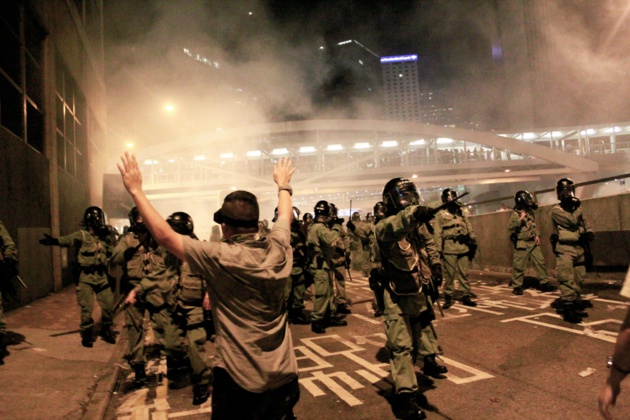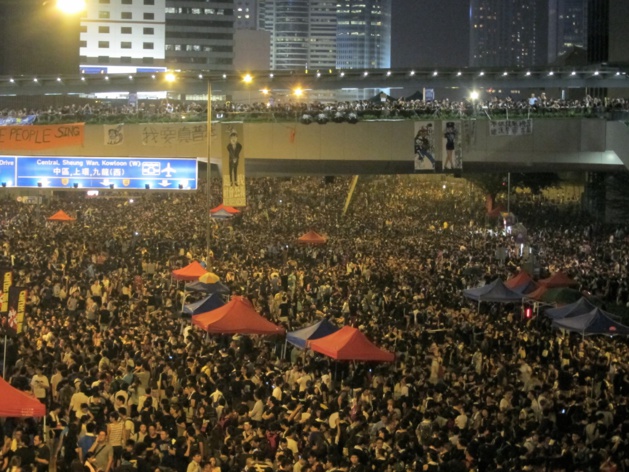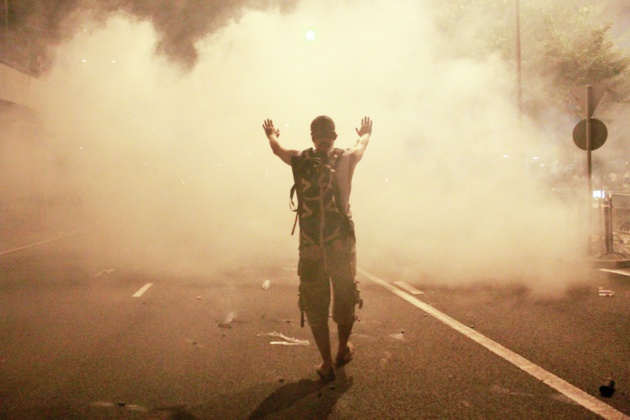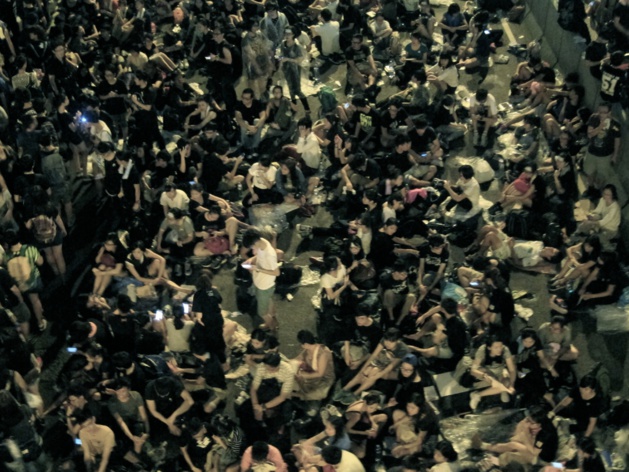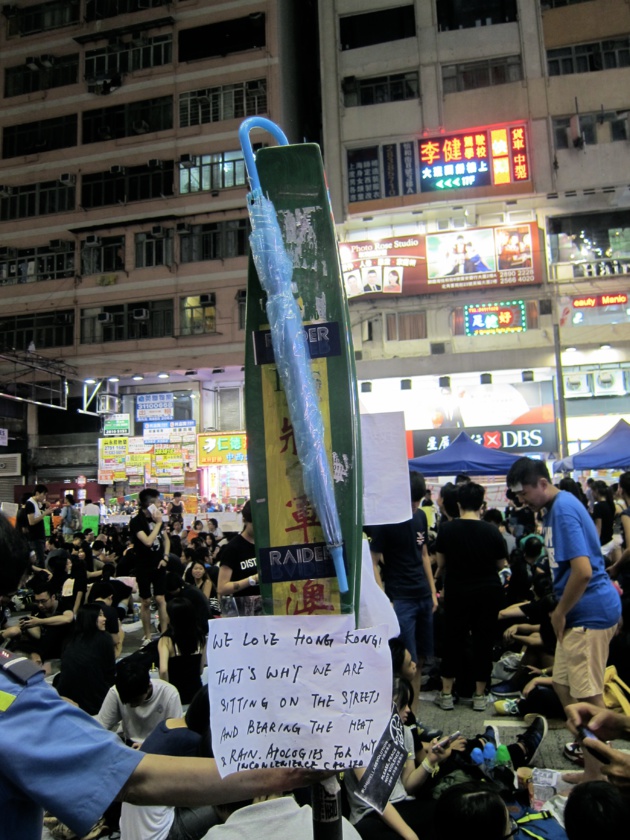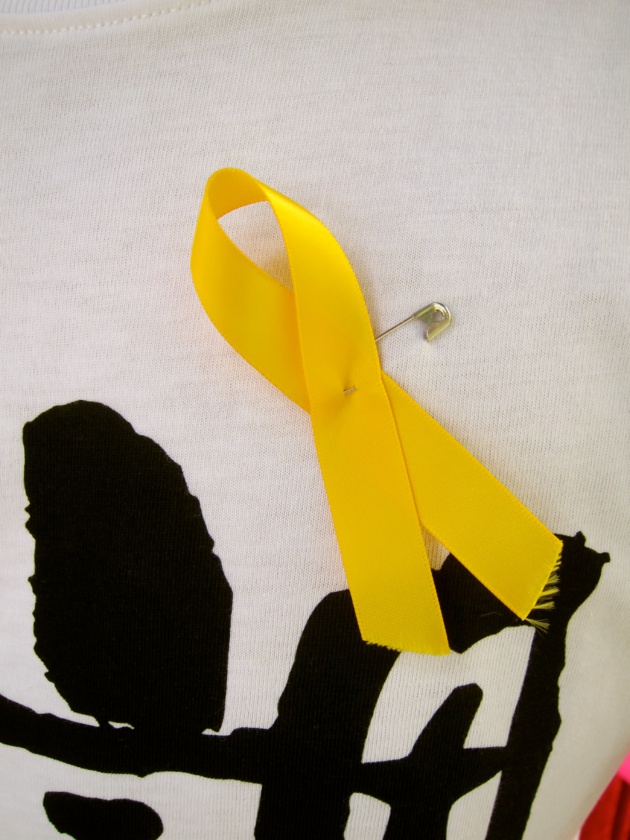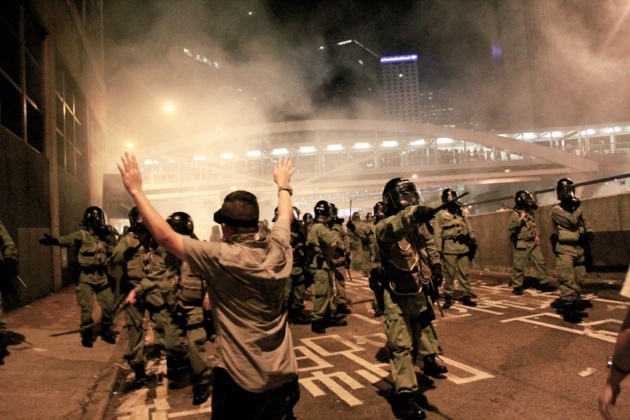
Photo credit Jake Lee Yin Wai
Since then, Hong Kong people could get, for the 2014 legislative election, the right to vote by universal suffrage for half of the 60 members of the legislative council, while professional colleges would vote for the other half. The Chief Executive keeps power about the executive field. Since retrocession, the charge to nominate and to vote for him is granted to the Election Committee, 1,200 members representing the interests of the government of Beijing.
A « fake democracy »
As 2017 election is coming soon, some elements of the Basic Law, adopted in 1990 and considered as « constitution » in Hong Kong, came out again – in particular the part stating that in 2017 the Chief Executive might be elected by universal suffrage. Indeed, article 45 states that « the ultimate aim is the selection of the Chief Executive by universal suffrage upon nomination by a broadly representative nominating committee in accordance with democratic procedures ». Some Hong Kong citizens then started to ask People's Republic of China (PRC) to respect this and to set universal suffrage voting for the representative of the region.
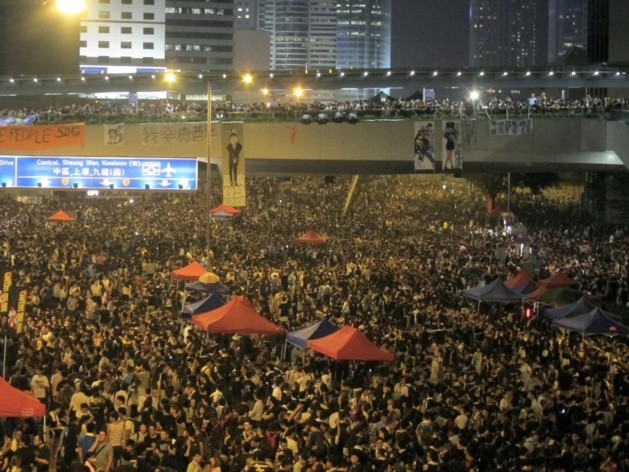
On late 31st of August, Beijing government officially published that the Chief Executive would be elected by universal suffrage indeed, yet that there would be a limit of two or three candidates, approved by Chinese government before being allowed to run for office. Such a statement led a part of the population to demand a « True democracy ».
This expression is not to be confused with a direct or semi-direct democracy, it's only about being able to choose the executive representative freely and without constraint. Even though the contract is absolutely not a guarantee about the universal suffrage set in 2017, and doesn’t give the way to make this universal suffrage work – since this term is really vague and can be interpreted by many ways – people from Hong Kong managed to gather themselves by these pro-democratic demands, and to form a substantial social movement.
The student movement and the week-long boycott of classes
Following the government statements, student unions in some Hong Kong universities created the Student Union which is therefore ready for a week-long protest and to demand a « true democracy » from PRC. From September 22nd to 26th, many pupils boycotted their classes to gather in different places and to protest, in particular in front of the Chinese University and at Tamar Park, next to the government building.
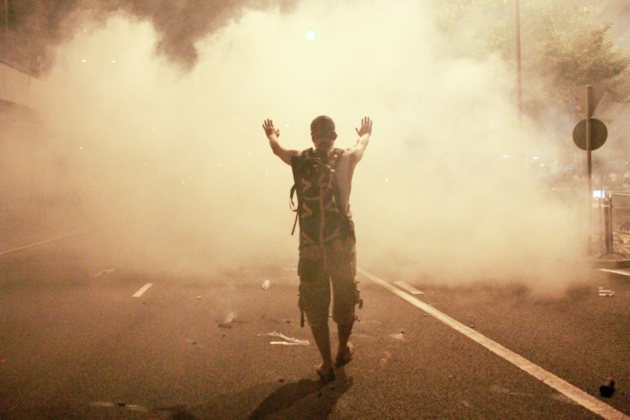
These five days have been marked by public conferences and speeches during which they wished to express at the population the problems still lasting at Hong Kong. According to Felix, philosophy student, « there are many speeches stating how bad the government is, yet I cannot give more details about this myself. However with only one conference now I know how the government gains profit through land ownership, and I know that after the bad management of territories from government, it's difficult for many people to get housing ». He goes on saying that the State is lying when they said that there are not enough building plots, and therefore they can raise the land price by keeping scarce accessibility to them.
This is only one of the many issues that could be solved by a Hong Kong elected representative. other issues such as high wealth inequalities in the population, strengthened by a mostly economic-growth oriented government, are also denounced by the protesters. The aims of these student protests were to get the public aware of these matters, and to convince people that they have means to struggle against these issues.
This is the reason why this week has been marked by a specific character. « It is our responsibility, our duty, to fight for our future », the student said, and then added, « if we don't, no one is going to do it ». However, the several student unions demanded explanations from the Chief Executive; otherwise they would go on protesting. Thus on Friday night the protesters supported by some thousands of secondary school students took the initiative to break in the government building hall where they have been arrested by the police on Saturday, September 17th in the morning.
The « umbrella revolution »
Occupy Central with Peace and Love organization used this opportunity to testify support towards the protesters. Its members gathered around the government building in order to show their support to the students, and to ask for them to be released. As soon as they arrived, the police tried to make them leave with tear gas. Because of the live broadcast on Hong Kong TV canals, the population quickly got indignant. In order to denounce such violence and to testify support toward the protesters, some joined the group. On Sunday, they were ten thousands people occupying a part of the highway next to the government buildings, guarded by the police.
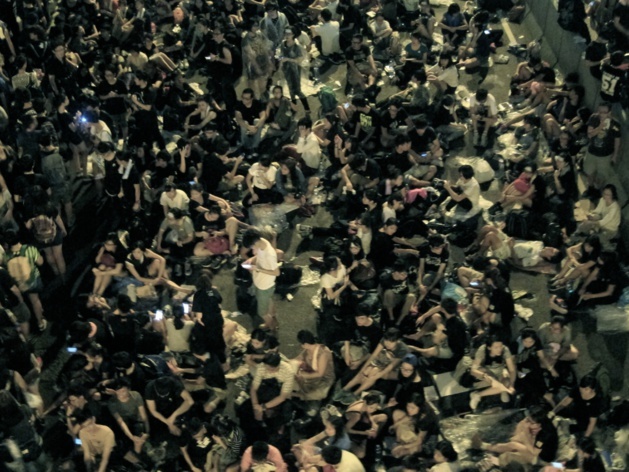
On Monday, the broadcast of the earlier photos and violent police reaction led to a rise in the crowd. They also proved the lack of efficiency of the tear gas against the protesters who came back more numerous, hands up as a symbol of pacifism. This progressive rise in the number of protesters is linked with the police violence: many people joined them to express their indignation against the police methods.
The connexion between police actions and rising number of protesters justifies that the police then received the order to have a more passive behavior, which allowed the crowd to occupy Tamar Park and Civic Square, two government buildings. On Monday and Tuesday, the number of protesters increased, always quietly and with a minimum police presence. The occupied sites also diversified: Central, Admiralty, Causeway and Mongkok districts were took by protesters.
Organization is essential: water and food are being distributed to protesters, in particular by students. Especially at evening, people are gathering for sit-ins everywhere, thus occupying the room. On Tuesday, even families were even seen there, another proof of the non-violent character of the movement. However this is far from leading to a successful movement.
The reasons why the situation will not lead to a new Tiananmen
As a reminder, Tiananmen is the place where in 1989, Chinese government had put an end to pro-democratic protests by sending the army. Students and other protesters had been occupying this place for seven weeks, and hundreds of people have died. The exact data are not available, and the event is still denied by Beijing.
This event, likewise the several examples of political prisoners broadcasted, is deeply rooted in Western minds. However, a couple of factors refute the likelihood of the current situation to turn into such a scenario. The first factor is the particular position of Hong Kong, which is an international city. Among its seven millions of inhabitants, an important number come from all over the world, which makes Hong Kong an interconnected city, more than other Chinese cities.
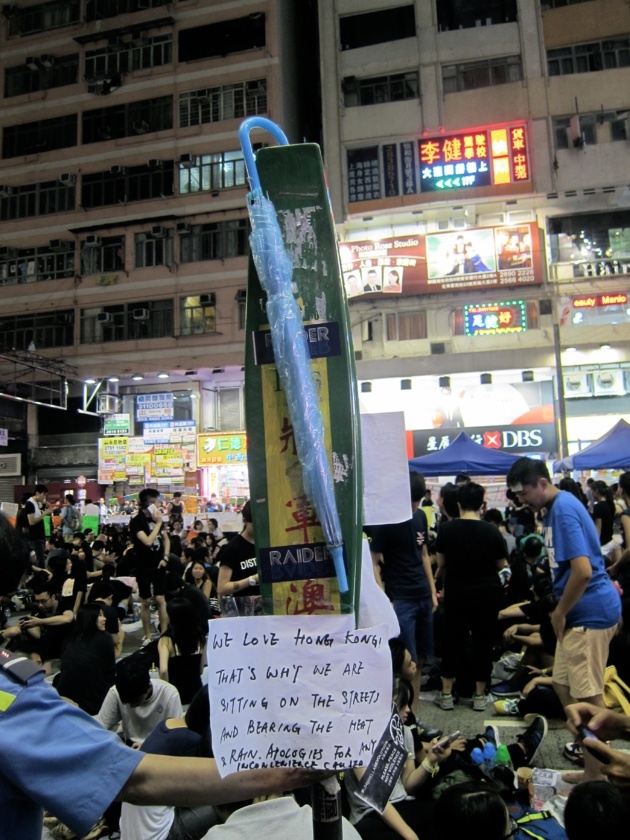
The second factor is the huge media coverage, both professional and individual. There are many reporters on site, which guarantees some control over the situation. Moreover, Hong Kong is the city where everyone has a smartphone, therefore, people themselves keep taking photos and videos. One only has to analyze the buzz created by the Sunday pictures and compare them with pictures of Monday and Tuesday, already less present, to understand that from now China will avoid this kind of escalation.
The last thing that PRC needs is a martyr able to unify even more the Hong Kong population and to get them upset, as it was the case in Tunis. According to a Hong Kong university teacher, using force to block social movements is not the typical Chinese method. Apart from the Sunday night « misconduct », the Chinese policy is a laisser-faire one. Social movements that do not meet opposition tend to vanish. People will start to get tired of it and to wish to go back to their daily life. This is what has been China’s strategy for these last years toward social movements.
What would universal suffrage change in Hong Kong ?
In Hong Kong, universal suffrage would only be a way to solve other issues. The population is tired of the changes that have been affecting their regions these late years. According to them, the policy implemented by Hong Kong government is more and more including the city into China. Apparently, the government tends to tie as much as possible the city with the rest of the country. People consider these changes as steps backwards instead of steps forward. Their rights making them completely different from the rest of the country are suspected to be in danger. They want a government that would take their needs into account, and not only obey to the PRC.
Because of the pro-Chinese government policy, wealth inequality, already mentioned previously, is increasing; the government mostly aims to give advantage to the upper classes in order to ensure their political support, at the expense of the poorest (no social security, unequal health system, more and more difficult access to housing, etc.). People feel as if their votes were not important, and through the universal suffrage they want to be considered. Universal suffrage would be only a tool to fix other issues. The current power would therefore have to consider them, and maybe even do something to solve these issues if they want to hold power. Therefore it is wrong to say that people are « only » going to protest for universal suffrage. It is a set of crisis that actually led people to protest « aloud ».
The reasons why protesters will not get to a « true democracy »
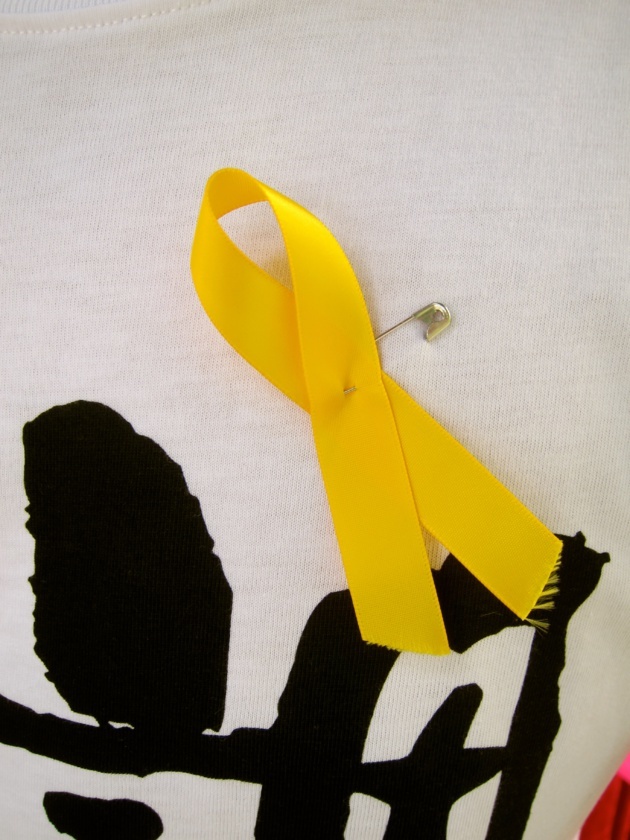
Occupy Central and the Student Union, the two main organizations in charge of the protest, both claim the democratic vote of Hong Kong Chief Executive. Yet, to win such claims seems very unlikely, even beyond the protesters I have spoken with. The problem is that the PRC will never give in, and Hong Kong people know it. Many protesters feel the same way.
The problem is that if PRC gives in the demands of the protesters – universal suffrage and a « true democracy » – the power given to Hong Kong representative would be too high in front of Beijing. He would represent people from Hong Kong and could refer to them anytime, as he would have been elected by them. Therefore he could legitimately take position against what Chinese government wants, and PRC would loose a high part of its power on one of its territory. There is a good reason why the implemented policy is called « one country, two systems ».
Furthermore, if the Chinese government concedes to these demands, there would be no reasons for refusing other regions some rights too; regions such as Tibet, yet also other territories in the South of China. If China gives in about Hong Kong, it would lead to a snowball effect, and Beijing is already afraid enough of the spread of the movement in continental China. There is a good reason why – only to refer to the most famous case – Instagram has been censured this week, as well as South China Morning Post (a Hong Kong daily newspaper) or AppleDaily that broadcast live, uninterrupted protest images.
Therefore how long is the movement going to last, how is it going to manage to last? In addition, since the government seems not so interested in the movement, protesters feel ignored and might end the movement, tired of it. No real leadership for Occupy Central and the Student Unions also questions the evolution: the meetings are huge, without any head emerging to lead the energy, to take real decisions inside the groups. This is making very unlikely the creation of a strategy for an evolution in the protests.
However these protests won't be useless, and some negotiations with Beijing are to forecast about the 2017 voting, which would not have been possible without the current occupation.














